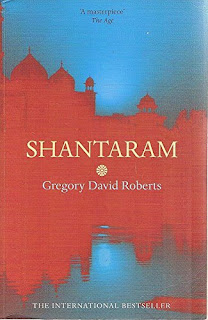Shantaram - Gregory David Roberts
The novel opens with the narrator arriving in Bombay, under a false passport bearing the name of Lindsay. He immediately has the good fortune to meet Prabaker, an Indian who is to be his guide into everything there is to know about Bombay and being Indian. He also gets to know and falls in love with Karla, a beautiful Swiss émigré and through her a group of other European ex-patriots who are involved in all manner of shady activities – although we come to see that things work ‘differently’ in India and the line between legality and illegality is an indistinct one.
His illegal status in the country eventually forces Lin, as he becomes known, underground – first finding himself living in a slum, where he puts his rudimentary first-aid knowledge to the service of the poor people there, becoming their local doctor. Gradually, he comes to know the people, their culture and their language, making money through shady activities, procuring hashish and doing black market money exchanges for tourists. Eventually he comes to work for Abdel Khader Khan, ‘Khaderbhai’ – a wise and powerful figure at the head of a vast money, gold and passport smuggling racket – a moralistic mafia criminal who will not get involved in the dirtier side of organised crime.
While the prose is always highly readable, insightful and inventive, it does often become somewhat overblown, the author demonstrating an over-fondness for aphorism (“Optimism is the first cousin of love”), overindulging in simile and metaphor, being notably effusive in his descriptions of women – “Her thick, black plait of hair was the rope by which a man might climb to heaven”. Describing Prabaker’s mother: “The high curves of her cheekbones were the mountains from which her amber eyes studied the world,” is followed a few pages later by “the lines, high on her cheeks were the dams she used to keep the tears in her eyes”. He reserves his worst excesses for Karla – “She was almost too beautiful; as beautiful as a blush of summer sunset on a sky-wide stream of cloud”, “She was the most beautiful woman I’d ever known. It was the beauty of the desert of dawn…”. Ok – we get it! In this respect it is inevitable that the eventual sex-scene description will be a hard-to-beat contender for the worst written sex scene of the year – “My body was her chariot and she drove it into the sun.” Ugh!
The writing however betrays a sensitive soul, despite the huge inner strength and outward displays of brutal physical power. In Karla, he finds his one true love; in his mentor and protector Khaderbhai, he finds a surrogate father, who directs, instructs and praises and devotes himself utterly to him; in fellow criminal Abdullah and in Prabaker he finds brotherhood. Behind the occasional purple prose then there are some beautiful observations about the people and the country, demonstrating his deeply humane vision. In an Indian prison he describes how the chained prisoners still manage to find a way to give grace to their movements, a small gesture of how the human soul cannot be defeated no matter how great the adversity.
All in all, Shantaram is a fabulous achievement, encompassing the development and rehabilitation of an individual, philosophical ponderings on the meaning of life, a loving depiction of a whole nation from its people, its politics and its culture to the darker side of its violence, cruelty, poverty and crime. It’s a book seething with life and love, a hugely readable monster of a book with never a dull moment, giving us an unusually literary and eloquent first-hand insight into the world of international crime.




Comments
Post a Comment